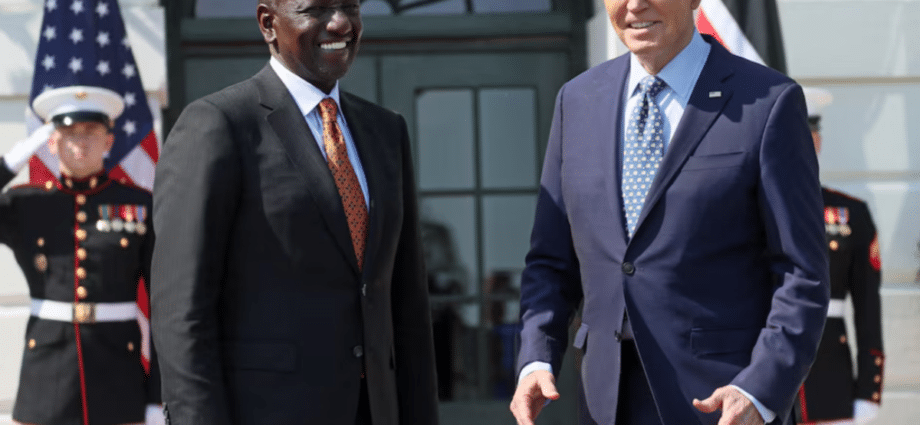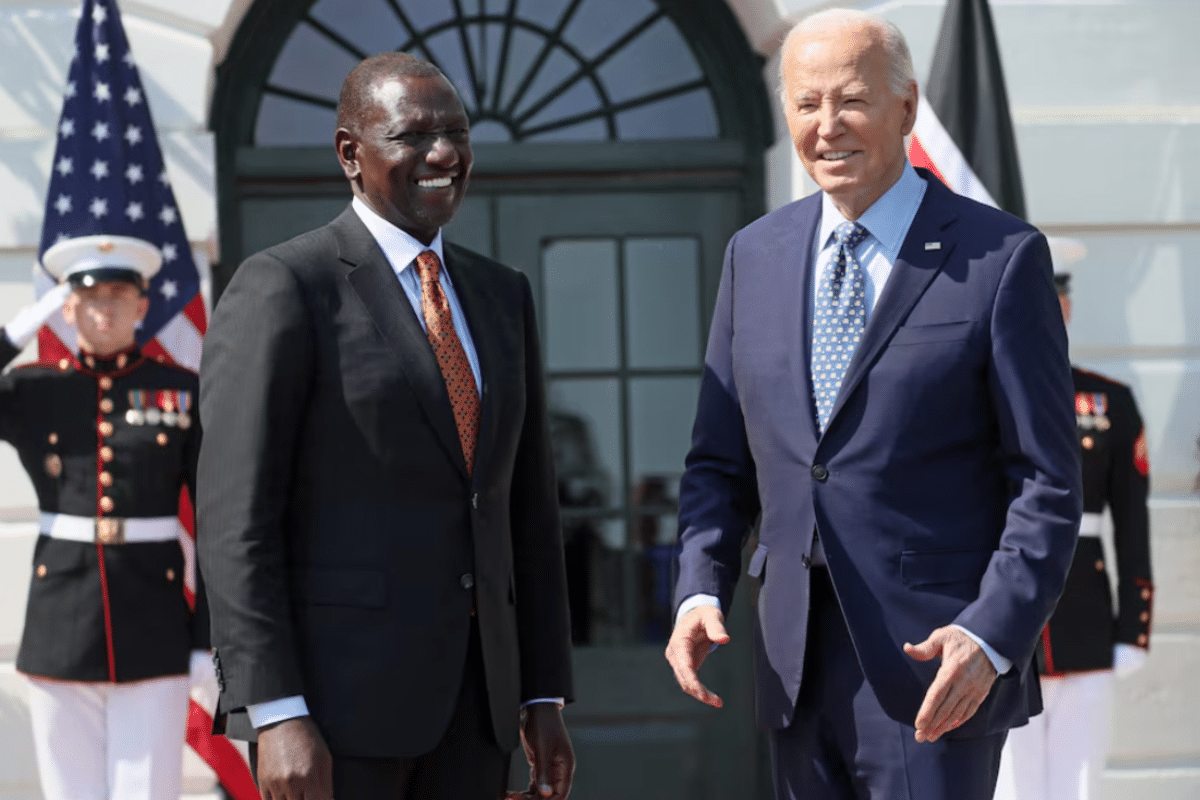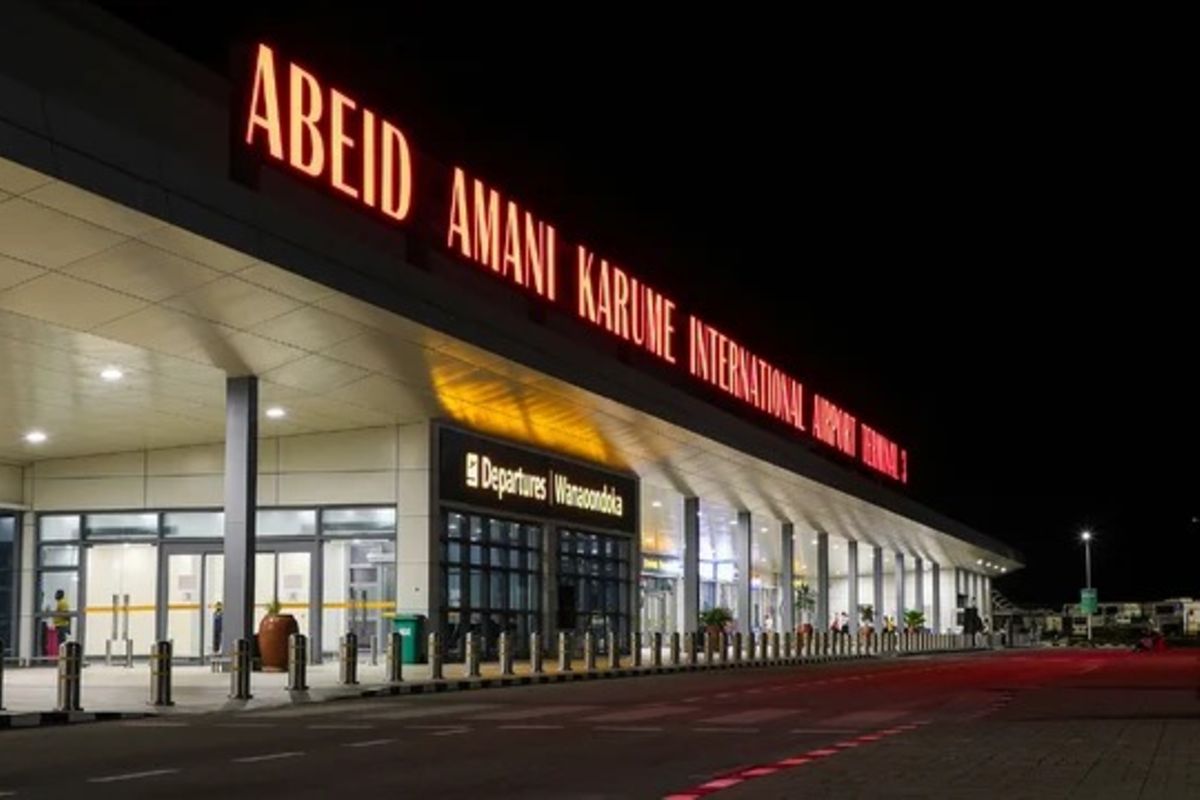President William Ruto and his US counterpart Joe Biden on Thursday announced a raft of multibillion-shilling new investment deals in Kenya as the two countries marked 60 years of partnership.
The new investment deals, announced on the final day of President Ruto’s four-day State visit to the US, largely focus on green energy, security, education and governance.
Dr Ruto became the first African leader to make a State Visit to Washington in 16 years since John Kufuor of Ghana in 2008.
“Decades of strong security cooperation between the United States and Kenya have played a critical role in East Africa and beyond,” the White House said on Thursday in a fact sheet of the State Visit. “This partnership extends to areas including international peacekeeping, peace negotiations, security governance, refugee inclusion, and cooperation in cybersecurity.”
The White House said Dr Ruto’s State Visit has strengthened the partnership between Washington and Nairobi on combating terrorist groups in East Africa, largely targeting al-Shabaab and ISIS elements in the region.
As a result, President Biden was later Thursday evening set to designate Kenya as a major non-NATO (North Atlantic Treaty Organisation) ally, reflecting Kenya’s status in cooperating with the US counterterrorism operations in Africa. Such a designation underlies Kenya’s growing status.
The United States has committed $4.9 million (Sh642 million under prevailing conversion rates of $1 is equal to Sh131) in new funding for Kenya and other East African countries to improve cooperation and coordination in fighting international criminal networks and holding criminals accountable.
The funding will go towards capacity building and reform efforts within the Kenyan police and justice sectors at a time when the country has committed to deploy its police to lead the Multinational Security Support (MSS) mission to provide security assistance to Haiti.
The two countries also announced a new $7 million (Sh917 million) partnership to advance and strengthen the modernisation and professionalisation of Kenya’s National Police Service, largely focused on staff and training development.
In an effort to reduce overcrowding in Kenya’s prisons and improve conditions in detention centres, Washington has announced a new $2.2 million (Sh288 million) initiative to provide training, mentoring, and technical assistance to implement priority reforms. Dr Ruto’s visit came on the back of Washington through 2024 National Trade Estimate Report on Foreign Trade Barriers (NTE), complaining of entrenched bribery, extortion and political interference in Kenya’s judicial system as a barrier to attracting investments. In this regard, the US said it will provide $1.55 million (about Sh203 million) towards programmes aimed at combating corruption.
That funding comprises $500,000 (Sh65.5 million) under the new Fiscal Integrity Programme to enhance transparency in Kenya’s budget processes, by enhancing inclusivity and increasing citizen engagement.
A similar amount will go towards broadening the reach and effectiveness of anti-corruption advocacy by empowering civil society actors to create and disseminate multimedia content that engages citizens and mobilises action against corruption.
Some $250,000 (Sh32.75 million) will be injected into supporting the Kenyan government to combat corruption through the Global Accountability Programme, while $300,000 (Sh39.3 million) will go to Kenya’s proposed Whistleblower Protection law aimed at strengthening the country’s anti-corruption legal architecture.
Dr Ruto’s foreign policy realignment with traditional partners such as the US will also likely see increased funding towards the civil society groups, whose activities were largely curtailed during the previous regime of Uhuru Kenyatta.
The US and agencies announced $2.6 million (Sh340.6 million) towards supporting independent civil society groups. This comprises an additional $1.3 million (Sh170.3 million) of funding by US Agency for International Development (USAID) under youth empowerment programme to strengthen political engagement at the subnational level and $600,000 (Sh78.6 million) to advance disability inclusion.
The US also plans to spend $700,000 (Sh91.7 million) in new assistance to support these efforts to institutionalise groundbreaking, global best practices for civil society protections after Dr Ruto executed the legal instruments to operationalise the 2013 Public Benefits Organization Act on May 9. That support is in addition to the $2.7 million (Sh353.7 million) funding the US is already providing to improve civil society engagement in and oversight of governance processes.
“Washington is showing that Kenya is a major ally of the US,” David Monda, a Kenyan international relations scholar who teaches political science at the City University of New York, said via email. “Washington is indicating to other continental powers like South Africa that have taken positions antagonistic to the US on the Russia-Ukraine War and the Israel-Hamas conflict, that Washington has alternatives on the continent.”
Other major deals announced during Dr Ruto’s visit to the US include $1.5 million (Sh196.5 million) in new technical assistance to support Kenya’s electoral legal framework reform process aimed at strengthening the election commission, political parties, and campaign finance.
The US has also committed $3.6 million to support the accelerated connection of more homes, businesses, and institutions in Kenya to cleaner electricity as part of its Empowering East and Central Africa programme.
Meanwhile, the Kenya National Highways Authority (Kenha) and US-based Private Equity Everstrong Capital LLC have signed a deal to start the construction of the $3.6 billion (Sh472.9 billion) expressway from Mombasa to Nairobi. Dubbed Usahihi Expressway, the toll road will upset the Chinese-built Mombasa-Nairobi Standard Gauge Railway (SGR), as a major rival for traffic.
The US has also lined up $250 million (Sh32.75 billion) in new investments in Kenya through the International Development Finance Corporation (DFC), including $180 million (Sh23.58 billion) for a major affordable housing project. That will bring DFC’s portfolio in Kenya to over $1 billion (Sh131 billion).















